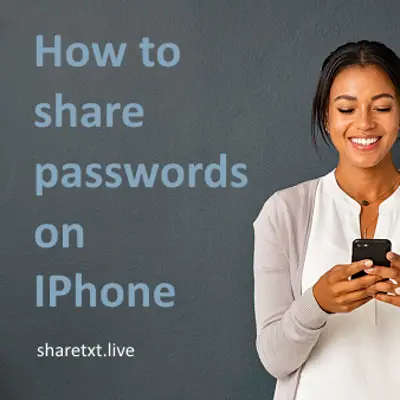Have you ever wondered how to securely share passwords and secret codes online between your devices using your browser, without having to install the same password manager app on multiple devices.
There are numerous reasons why this could be required, and there are various ways around it - some of these may also be more appropriate than others depending on what you're trying to achieve.
In this article, I will go over how to use an encrypted service called ShareTXT which enable you to safely share your passwords, hash codes, seed phrase, mnemonic phrase, or any other secret code between your devices for free.
Password managers are expensive and are not the correct solution when you want to quickly share specific personal information that might be of value to other parties as not everyone will have the application installed on their device.
The solution that I am proposing will enable you to paste your passwords into the recipient's device without needing to install any app.
You don't even need to create an account or pay a fee to get started. The application is free to use.
Why you might need to share your password
In general, it is not a good idea to share your password with others. Your password should be kept secret at all times.
Companies have shared passwords for their documents or WiFi that are shared with employees as plain text documents.
Information such as these can get into the hands of bad actors who can use it to infiltrate and sabotage the business.
Other reasons why you might need to share passwords would be to allow access to a shared resource such as a shared WiFi password or SSH keys, in order to share login information between multiple smart devices.
How to secure your password before sharing
While preparing to share your password, take a few precautions to ensure that it is secure.
- Create unique passwords: never use the same password for more than one account. This minimizes the risks to your other accounts in the situation that one account is compromised.
- Create strong passwords: a good password will contain uppercase, and lowercase characters, numbers, and special characters/symbols. Try to make your passwords at least 8 characters or more.
- Never share your passwords in plain text formats: this leaves you vulnerable and exposes you to several attack vectors.
- Do not share your passwords to your email inbox: it is unencrypted and if you forget to log out, an attacker can simply copy your passwords and use them maliciously.
- Setup two factor authentication: before sharing your passwords, ensure that you add another layer of security to protect your data. Most apps offer this option. It requires you to authenticate yourself multiple times before accessing a given resource.
How to safely share your password online
The best way to share your passwords is with an encrypted service. These services hash your passwords so that even if it is intercepted during transmission, your password can not be decrypted and will be useless to the attacker.
Sharing your passwords with ShareTXT
- Using your web browser, go to sharetxt.live
- Visit the same link on the other device that you want to share your passwords
- Type or paste your password into the input field to share it between the connected devices
Data encryption occurs before your password is sent, it gets decrypted and displayed on the device after it is received.
ShareTXT enables you to "Claim a private link". This provides additional security and requires you to log in before sharing your private information.
You can log in with either your email or Google account to save and manage your passwords and secret codes.
Conclusion
Most people often look for apps such as password managers to help them share their passwords and install them on all their devices.
These apps are not free and require a subscription. For the simple task of sharing passwords, they are overkill, they break your flow and are complicated to use.
ShareTXT provides a simple, quick, and secure way to share your passwords and secret codes between your devices for free.
We covered a lot of ground in this post, but I hope that you found it informative and helpful.
Good security practices can be difficult to keep up with, but they're so important that we should all make at least the effort to keep ourselves safe. With the right tools, it's not hard to do, either!










